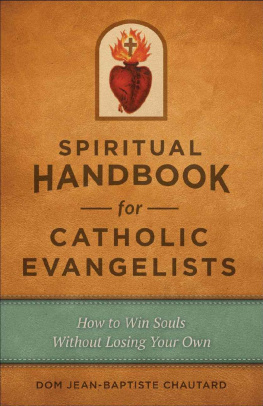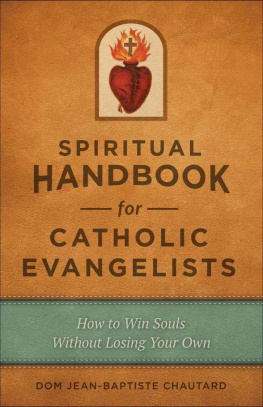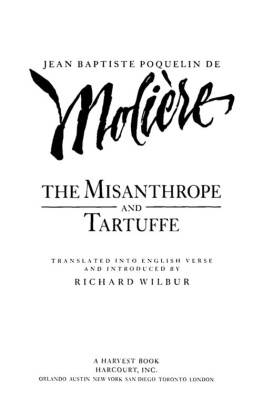Dom Jean-Baptiste Chautard - Soul of the Apostolate
Here you can read online Dom Jean-Baptiste Chautard - Soul of the Apostolate full text of the book (entire story) in english for free. Download pdf and epub, get meaning, cover and reviews about this ebook. year: 1977, publisher: TAN Books, genre: Religion. Description of the work, (preface) as well as reviews are available. Best literature library LitArk.com created for fans of good reading and offers a wide selection of genres:
Romance novel
Science fiction
Adventure
Detective
Science
History
Home and family
Prose
Art
Politics
Computer
Non-fiction
Religion
Business
Children
Humor
Choose a favorite category and find really read worthwhile books. Enjoy immersion in the world of imagination, feel the emotions of the characters or learn something new for yourself, make an fascinating discovery.

- Book:Soul of the Apostolate
- Author:
- Publisher:TAN Books
- Genre:
- Year:1977
- Rating:4 / 5
- Favourites:Add to favourites
- Your mark:
- 80
- 1
- 2
- 3
- 4
- 5
Soul of the Apostolate: summary, description and annotation
We offer to read an annotation, description, summary or preface (depends on what the author of the book "Soul of the Apostolate" wrote himself). If you haven't found the necessary information about the book — write in the comments, we will try to find it.
Soul of the Apostolate — read online for free the complete book (whole text) full work
Below is the text of the book, divided by pages. System saving the place of the last page read, allows you to conveniently read the book "Soul of the Apostolate" online for free, without having to search again every time where you left off. Put a bookmark, and you can go to the page where you finished reading at any time.
Font size:
Interval:
Bookmark:

Nihil Obstat: M. Maurice Molloy, O.C.S.O.
M. Alberic Wulf, O.C.S.O.
Imprimi Potest: M. Fredericus Dunne, O.C.S.O.
Abbas B.M. de Gethsemani
Imprimatur: Joannes A. Floersh, D.D.
Archiepiscopus Ludovicopolitanus
Die 16a Septembris, 1946
Copyright 1946 by the Abbey of Gethsemani, Inc., Trappist, Kentucky.
First published in 1946. Published by TAN Books, an Imprint of Saint Benedict Press, LLC, in 1974. Retypeset and republished by TAN in 2008 and 2012.
ISBN: 978-0-89555-031-6
Cover photo creditsleft to right, top and bottom:
Minor Elevation at the Tridentine Mass, courtesy of The Institute of Christ the King, Chicago, IL.
Cathedral of the Blessed Sacrament, Sacramento, CA, photo copyright Milo Persic.
Sister Adorers of the Royal Heart of Jesus, courtesy of The Sister Adorers, Sieci, Italy.
Grandmothers 90th Birthday, photo copyright Ann Marie Kurtz; iStockphoto.
The Hands of the Poor, photo copyright Sean Warren; iStockphoto.
Schoolboys, photo copyright Steven Stone; iStockphoto.
Cover design by Milo Persic.
Published in the United States by
TAN Books
P.O. Box 410487
Charlotte, NC 28241
www.tanbooks.com
Printed and bound in the United States of America.
DOM CHAUTARD
A B IOGRAPHICAL N OTE
It is surely significant that the day on which the author of this modern spiritual classic, the Soul of the Apostolate , was born in the French Alps, was the feast of St. Gregory the Great, March 12, 1858. For it is one of the cardinal principles of St. Gregorys mystical and ascetical teaching that there exists an inseparably close relation between the so-called active and contemplative lives, so much so that though one may dominate over the other (and the most perfect state is that in which contemplation dominates) yet in the soul of anyone called by God to high sanctity the life is always essentially a mixture of contemplation (love of God) and action (love of neighbor).
Now it is precisely this problem which the brilliant and ardent Cistercian abbot of Sept-Fons, in central France sets himself to elucidate and discuss in this pamphlet, which has gone into many editions and hundreds of thousands of copies in many languages, and which was the bedside book of Pope Pius X. The reason why St. Gregory the Great was so perfect in expounding the relation of action and contemplation is that, called from the cloister to the Papacy in one of the crises in the history of the Church, he found out what that relation was in the crucible of trial and labor and distraction and struggle.
And the reason why Dom Chautard has been able to write so well on the same theme for our own age, intoxicated with the confusion of its own sterile and purely worldly activities, is that he too was so often torn, by the hand of God, from the cloister, and made an instrument of Divine Power and Providence and Love to protect the monks and nuns of the Cistercian Order, and to call priests, religious, and layworkers in Catholic Action to a life of closer union with God, in Whom is the only principle of vital and effective social action: divine charity, won for us by the Sacrifice of Christ, His Incarnate Word, upon the Cross.
The Chautards ran a little bookshop, and the father of the future monk was one of those purely nominal Catholics who sometimes go to Mass, but whose principles are entirely vitiated by the materialistic and utilitarian views of the middle class to which they belong. The mother was in a different category. She had more faith, and she saw to it that her children were educated as Catholics.
However, as their son grew into young manhood, neither he nor they had an idea of his entering religion. He went to Marseilles to study economics at the university, with a commercial career in mind. There was a relative in Chile. Perhaps the young man would join him and make a fortune there. The atmosphere of the University of Marseilles was scarcely Catholic, but in a footnote to one of the later sections of the Soul of the Apostolate , the author tells us how he was one day much affected by the simple devotion with which a priest was reciting his Breviary, and he began to ask himself why he did not pray more himself.
Soon he began to frequent a Catholic club, founded for the working and lower middle-class youth of the great Mediterranean port by the saintly Father Allemand.
When Dom Chautard describes his experience of this really vital and supernatural brand of Catholic Action in the Soul of the Apostolate he is referring to a later visit to Fr. Allemands club, after his ordination.
But indeed it may be said that Dom Chautards vocation, and the Soul of the Apostolate itself are both to be traced to Fr. Allemands club, at Marseilles.
If this youth-club had been one of those more or less timid compromises with modern notions that make so much Catholic Action seem like no more than a Y.M.C.A. run by a couple of priests, Dom Chautard would have probably ended by exporting nitrates from Chile. But here he found something more than third-rate amateur dramatics and the atmosphere of a secular social club. This was more than a tame and sheepish attempt to rival the attractions of the dance hall and the cafe by vainly trying to beat them at their own game of pleasing and entertaining human nature. There was something more, something that appealed to a much deeper and more urgent and more vital necessity: faith, supernatural charity, a deep and simple and unbreakable solidarity among souls united, as he was to discover, in Christ. And, as a result of all this, he began to taste that peace which the world cannot give.
It was when he was kneeling in prayer, one day, in the chapel of the club, at the tomb of its saintly founder, that he received the grace of his vocation to religion.
He countered the violent and embittered opposition of his fathers bourgeois hatred of religious orders, by a barefoot pilgrimage up the stony Alpine roads to Our Ladys Mountain Shrine at Laus, and in answer to his prayers, he was admitted as a postulant to the Trappist Abbey of Aiguebelle, near the Rhone, north of Avignon, in 1877.
Here he began to learn, with inexpressible joy, how to live the contemplative life as it had been practiced for centuries according to the Rule of St. Benedict and the Usages of the Cistercians. He began to live the life of a White Monk, that life of obscurity, obedience, silence, poverty, solitude, hidden in the secret of Gods face, that is, of His presence and of His will. But it is above all, a life of ceaseless praise.
Dom Gabriel, the abbot of this ancient monastery, was a friend of the great Benedictine Dom Guranger and he stressed the liturgical character of the Cistercian life above all. That is one reason why a most valuable section of the Soul of the Apostolate is the one devoted to the liturgical life. Surely there is nothing more fundamental and nothing that is more closely interconnected with Dom Chautards conception of Catholic Action as a reproduction of the life of the early Christians: and it was the earliest ages, especially the Patristic age, that were the most purely liturgical and, as we see from the writings of the Fathers, the fullest of pure charity, based on sacrifice, without which Catholic Action is a mockery.
But like so many White Monks before him, like St. Bernard and St. Peter of Tarentaise, Jean-Baptiste Chautard was not destined to taste for long the unmixed joys of contemplation. He was not yet solemnly professed, being still in the midst of his studies, and just ordained deacon, when Aiguebelle was faced with complete ruin.
Dom Gabriel had had some opportunity to estimate the young monks practical ability, since Fr. Jean-Baptiste had been serving for some time as guest-master. The abbot took the bold step of sending him to Paris to try and use his ingenuity to save his community. But all Fr. Chautards native ability and eloquence and learning and economics proved useless. Finally he threw himself down in prayer at the shrine of Our Lady of Victories. When, a half hour later, he emerged into the street, a stranger came up to him saying: Are you not a Trappist? What brings you to Paris, Father? Can I be of any assistance to you? The rest of the story can be guessed. Aiguebelle was saved. And Dom Chautard had his first real practical experience of the relative worth of natural activity, and activity aided by, and based on prayer.
Next pageFont size:
Interval:
Bookmark:
Similar books «Soul of the Apostolate»
Look at similar books to Soul of the Apostolate. We have selected literature similar in name and meaning in the hope of providing readers with more options to find new, interesting, not yet read works.
Discussion, reviews of the book Soul of the Apostolate and just readers' own opinions. Leave your comments, write what you think about the work, its meaning or the main characters. Specify what exactly you liked and what you didn't like, and why you think so.


![St. Jean-Marie Baptiste Vianney - The Little Catechism of the Cure of Ars (with Supplemental Reading: Confession: Its Fruitful Practice) [Illustrated]](/uploads/posts/book/270052/thumbs/st-jean-marie-baptiste-vianney-the-little.jpg)





